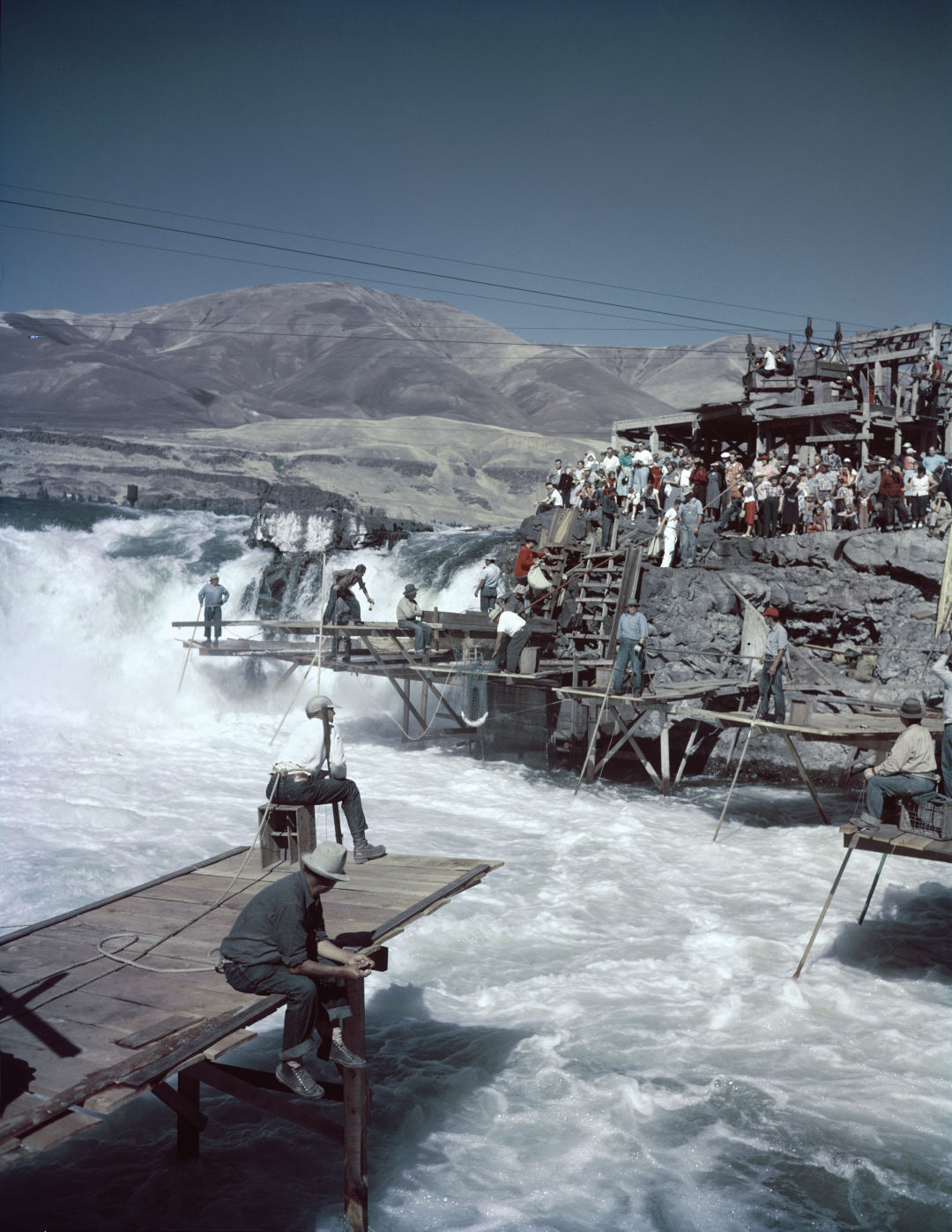forum
library
tutorial
contact

The Day The Dalles Dam
Silenced Celilo Falls
by Gabriel Granillo
Portland Monthly, March 9, 2022
|
the film forum library tutorial contact |

|
The Day The Dalles Dam
by Gabriel Granillo
|
"I'm trying to use a careful word, not using the 'genocide' word, but to me that's what it was.
That's what the Celilo loss means: we've lost longevity."
 The 1800s ushered in an era of radical change for the Gorge. Steam-driven paddle boats and crude railways gave rise to logging industries, but the most pertinent development came later, in 1937 and 1957, with the construction of the Bonneville and The Dalles Dams, respectively, the effects of which are still rippling through the Native communities -- Yakama, Klickitat, Umatilla, and others -- who had long lived by and depended on the resources of the river.
The 1800s ushered in an era of radical change for the Gorge. Steam-driven paddle boats and crude railways gave rise to logging industries, but the most pertinent development came later, in 1937 and 1957, with the construction of the Bonneville and The Dalles Dams, respectively, the effects of which are still rippling through the Native communities -- Yakama, Klickitat, Umatilla, and others -- who had long lived by and depended on the resources of the river.
Wilbur Slockish, a member of the Confederated Tribes and Bands of the Yakama Nation, was 12 when The Dalles Dam flooded Celilo Falls, the site of a centuries-old intertribal fishing and commerce market where dozens of tribes caught chinook salmon and other fish. Here, Slockish remembers Celilo Falls and how life has changed since the construction of the dam.
I was on my way to Albuquerque and I went by Shoshone Falls. I got there, and I could hear the falls making noise -- the roar. I put [my blanket] on the lawn, under a tree, and laid back and I listened to the falls. The park ranger came over and asked me if I was OK. "Are you sick? Can I be of any assistance? Do you need any medical help?" I told him, "No. I'm just listening to these falls." It wasn't as loud as Celilo Falls, but I got to hear it in my mind, and I used it to remember when I was young listening to that and the size of the fish that my family would be bringing back to the dry sheds that were there.
The fish survived and we survived all of the things that they did to us, and Celilo Falls was one of the major roadblocks ... because the water wasn't flowing and [the fish] need cold water and the water started warming. It was an elimination of our food source.
It seems to me, because of the chemicals and all of the other things in this river, the fish aren't as hardy as they used to be, as strong [as they used to be]. It's the same with our people, because we're not as strong as we used to be ... because of the lack of our own natural food supply -- our salmon, our deer, our elk, our roots, our berries, our medicinal plants. We were forbidden [after the dam was built] to partake of those and some of us resisted, my family resisted, and we kept going. So our health has really suffered from that. The length of our lifetime has shortened.... I'm trying to use a careful word, not using the "genocide" word, but to me that's what it was. So to me, that's what the Celilo loss means: we've lost longevity.
People got to realize these are gifts of the land. Whether it's water, the animals, whether they fly, or whether they have hooves. They're good gifts of the land.
Wilbur Slockish was born in 1944 in Wapato, Washington and now lives in Wishram, near The Dalles Dam. He spends his time educating the public about Native rights and fighting against pollution and the disposal of nuclear waste near Native reservations. Slockish's story has been edited for length and clarity.)
Related Pages:
Remembering Celilo Falls 62 Years After It Was Silenced by The Dalles Dam by Donald W. Meyers, Yakima Herald, 5/12/19
learn more on topics covered in the film
see the video
read the script
learn the songs
discussion forum
